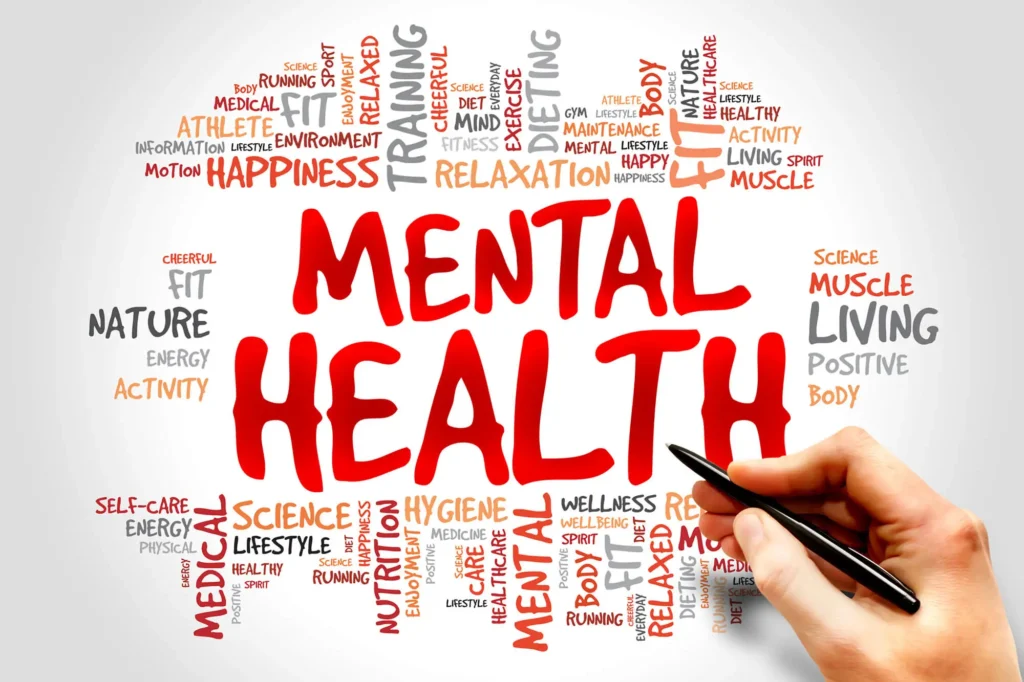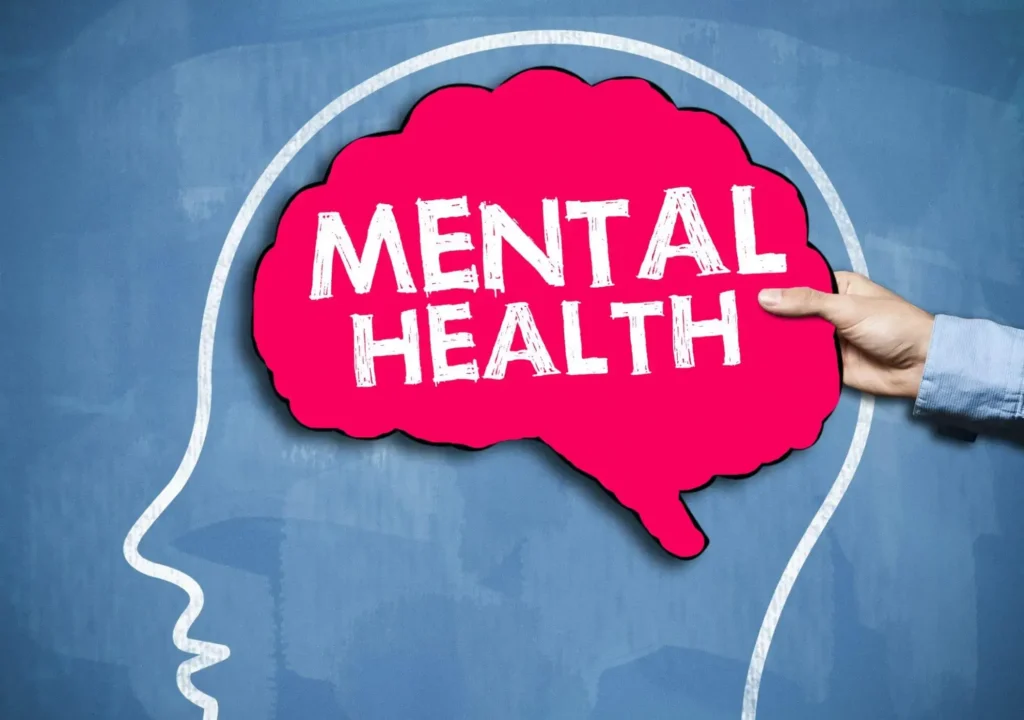In today’s busy world, it’s important to understand the deep connection between exercise, mental health, and improving happiness. Working out isn’t just good for shaping your body, Moreover, it’s also great for your mind and soul. These days, when worry and Mental Health Problems are getting worse. Thus, it’s important to look into how exercise can help mental health. The science behind exercise’s positive effects on Mental Health is strong. It raises levels of neurotransmitters and reduces the symptoms of anxiety and sadness. By learning more about this subject, we can see not only the physiological processes at play, but also the huge potential for people to build emotional strength and health through regular physical exercise.

The Science behind Exercise and Mental Health
Scientists have a good knowledge of the complex link between exercise and mental health. Engaging in physical activity causes the release of endorphins, dopamine, and serotonin—neurotransmitters known to regulate mood and reduce stress. Also, regular exercise encourages neuroplasticity, which makes the brain work better and make it less likely to develop mental illnesses. Thus, the results of many studies show that exercise can help people with anxiety, sadness, and even ADHD. From changes in neurochemicals to changes in the structure of the brain. The science behind exercise’s effect on mental health shows how important it is as a whole-person approach to health. Moreover, understanding these processes gives people the power to use the changing power of exercise for mental health.
Benefits of Exercise for Mental Health
Regular exercise is good for your mental health in many ways. It lowers stress, improves happiness, and helps people who are depressed and anxious. Also, exercise also improves brain function and self-esteem, which is good for your general health and vitality.
Stress Reduction and Emotional Well-being
Physical exercise lowers cortisol levels and encourages relaxation. Moreover, which lowers stress and improves emotional health and flexibility.
Mood Enhancement and Happiness
Neurotransmitters like endorphins, dopamine, and serotonin are released when you exercise. So, these chemicals make you feel good and improve your mood.
Management of Depression and Anxiety
By changing the chemistry of the brain and taking your mind off of bad thoughts, exercise has been shown to help people with sadness and anxiety.
Thinking Skills and Mental Sharpness
Brain functions like memory, attention, and problem-solving get better when you work out regularly. This makes your mind sharper and improves your general cognitive performance.
Exercise and Mood Regulation
Regular exercise is a great way to keep your mood in check. Endorphins are neurotransmitters that make you feel good and happy. They are released when you exercise. Exercise also lowers stress factors like cortisol, which helps you sleep better and feel better about your own self-worth. Including exercise in your daily life can make you feel and think better in general.
Endorphin Release
Endorphins are natural chemicals in the brain that make you feel good and joyful. When you exercise, your body releases these chemicals. By making more of these chemicals, regular exercise can help fight feelings of sadness or low mood.
Getting rid of stress hormones
Exercise is a powerful way to reduce stress because it lowers cortisol levels, which is the body’s main stress hormone. Getting some exercise can help relieve stress and tension, making you feel cool and relaxed. It is proven that regular exercise can help reduce stress and improve your ability to control your mood.
Better quality of sleep
Regular exercise is linked to longer and better quality sleep. Being active helps keep the body’s internal clock in balance, which leads to better, more restful sleep. Getting enough sleep is important for controlling your mood because it lets your brain and body rest and recover. Also, improves your mental health and ability to handle stress.
Better self-esteem
Working out can help you feel better about your self-esteem and confidence. Reaching exercise goals, no matter how big or small, can make you feel better about yourself and your work. Physical exercise can also help people feel better about their bodies and their overall self-worth, which can lead to a more positive outlook and better mood regulation.
Types of Exercises for Mental Health
Different kinds of exercise can be very good for your mental health. Running, swimming, and other aerobic activities raise the heart rate, which makes endorphins come out. Strength training makes you feel better by improving your self-esteem and confidence. Mind-body exercises, like yoga and tai chi, help you focus and be more aware. They also reduce worry and anxiety. Adding different kinds of exercises to your schedule can be good for your mental health as a whole.

Writing with subheadings:
Workouts that burn fat
Running, cycling, and swimming are all aerobic sports that raise the heart rate and send more blood to the brain. This causes neurotransmitters called endorphins to be released, which make you feel good and lessen the effects of anxiety and sadness. For good mental health, you need to do physical exercise regularly.
Workouts for strength
Weightlifting and other forms of muscle training not only make you stronger, but they also make you feel better mentally. Strength training helps you reach your fitness goals, which boosts your confidence and self-esteem. This makes you feel better about life in general and improves your mental health.
Mind and body exercises
Mind-body movements such as yoga, tai chi, and Pilates emphasize the connection between the body and mind. These practices prioritize mindfulness, deep breathing, and relaxation techniques, reducing worry and anxiety. Mind-body exercises can help you think more clearly, feel more balanced emotionally, and be healthier generally.
Exercise Frequency and Duration
How often and how long you exercise are two very important factors in getting the most health benefits. To reach your goal of at least 150 minutes of moderate-intensity exercise or 75 minutes of vigorous movement per week – you must be consistent. It’s important to keep your workouts interesting and do muscle training at least twice a week. To find the best workout plan for your needs, you should always talk to a medical professional.
Recommended Guidelines
Aim to do at least 150 minutes of moderately intense exercise or 75 minutes of intense exercise spread out over several days each week. Additionally, do muscle-strengthening tasks with your main muscle groups at least twice a week.
Consistency is Key
To get the most out of physical action, you need to do it regularly and consistently. Stick to a plan that works for you. Plan your workouts so that you get the recommended amount of exercise and how often.
Different Workouts
Include a variety of aerobic, strength, and flexibility tasks in your workouts to keep them interesting. This keeps you from getting bored and makes sure that you work out different muscle groups and get fitter generally.
Individualized Approach
Talk to a doctor or fitness professional to find out how often and for how long you should be exercising based on your wants and goals. If you’re making an exercise plan, you should think about your age, fitness level, health, and personal tastes.
Overcoming Barriers to Exercise
People who are trying to get fit often run into problems that stop them from making progress. Some of the most common barriers are not having enough time, motivation, finances, or physical abilities. There are, however, ways to get around these problems. Making workout plans, setting attainable goals, and finding fun things to do can all help motivate you. Also, making exercise a part of daily life and looking for social support can help you stay consistent. Physical limitations can be worked around by being able to choose tasks and change workouts to fit personal needs. Having a positive attitude, celebrating small wins, and getting professional help when needed are also helpful ways. Additionally, those people to get past problems and start a satisfying journey to better health and well-being through regular exercise.
Exercise as Complementary Therapy
When it comes to overall health, exercise is a powerful form of extra treatment. Including physical exercise in the treatment plans for a number of medical conditions improves health in general. Exercise can help with many types of healing, such as managing chronic pain, fighting depression, and easing the symptoms of worry. Its benefits go beyond the body; they also have a good effect on mental health and emotional balance. Exercise gives people the power to be an active part of their own health by changing neurochemicals, lowering inflammation, and boosting self-efficacy. Adding exercise to your regular treatments not only makes them work better. But, it also gives you a sense of power and energy as you try to reach your health goals.
Conclusion
In this world, it’s important to recognize the strong connection between exercise, mental health, and happiness. In addition to making you fit, exercise is good for your mind and spirit. As mental health becomes more important, it becomes important to understand how exercise affects the brain. From changes in neurotransmitters to changes in the structure of the brain, data shows that exercise can change things. Regular exercise builds mental strength and vitality, which leads to a more satisfying life.











